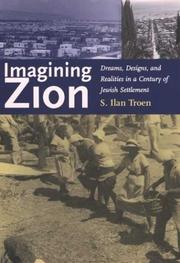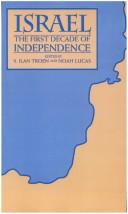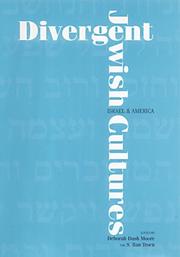| Listing 1 - 6 of 6 |
Sort by
|

ISBN: 1281729906 9786611729905 0300128002 9780300128000 9780300094831 0300094833 Year: 2003 Publisher: New Haven : Yale University Press,
Abstract | Keywords | Export | Availability | Bookmark
 Loading...
Loading...Choose an application
- Reference Manager
- EndNote
- RefWorks (Direct export to RefWorks)
This timely book tells the fascinating story of how Zionists colonizers planned and established nearly 700 agricultural settlements, towns, and cities from the 1880's to the present. This extraordinary activity of planners, architects, social scientists, military personnel, politicians, and settlers is inextricably linked to multiple contexts: Jewish and Zionist history, the Arab/Jewish conflict, and the diffusion of European ideas to non-European worlds. S. Ilan Troen demonstrates how professionals and settlers continually innovated plans for both rural and urban frontiers in response to the competing demands of social and political ideologies and the need to achieve productivity, economic independence, and security in a hostile environment. In the 1930's, security became the primary challenge, shaping and even distorting patterns of growth. Not until the 1993 Oslo Accords, with prospects of compromise and accommodation, did planners again imagine Israel as a normal state, developing like other modern societies. Troen concludes that if Palestinian Arabs become reconciled to a Jewish state, Israel will reassign priority to the social and economic development of the country and region.
Zionism --- Jews --- Agricultural colonies --- Moshavim --- Kibbutzim --- Urbanization --- Agriculture, Cooperative --- Cities and towns, Movement to --- Urban development --- Urban systems --- Cities and towns --- Social history --- Sociology, Rural --- Sociology, Urban --- Urban policy --- Rural-urban migration --- Hebrews --- Israelites --- Jewish people --- Jewry --- Judaic people --- Judaists --- Ethnology --- Religious adherents --- Semites --- Judaism --- Labor colonies --- Colonies --- Land settlement --- History. --- Colonization --- Economic conditions
Book
ISBN: 3031509145 Year: 2024 Publisher: Cham : Springer Nature Switzerland : Imprint: Springer,
Abstract | Keywords | Export | Availability | Bookmark
 Loading...
Loading...Choose an application
- Reference Manager
- EndNote
- RefWorks (Direct export to RefWorks)
“This is one of the most important books on Israel and Palestine to appear in some time” —Alan Dowty, University of Notre Dame, Past President, Association for Israel Studies, author of Israel/Palestine “One of the leading figures in the field of Israel Studies, Ilan Troen demonstrates the vast range of Jewish, Christian, and Islamic theological claims and their impact on our supposedly secular political debates. Sensitive to both religious and political interests, Troen brings a new depth of understanding to the conflict.” —Susannah Heschel, Eli M. Black Distinguished Professor, Dartmouth College “An important, accessible, and much needed contribution toward understanding the many entangled factors that make the conflicts in the Middle East so intractable.” —Philip A. Cunningham, Professor of Theology, President of the International Council of Christians and Jews, Saint Joseph's University, Philadelphia The struggle over Israel/Palestine is not just another contest by competing nationalisms or an instance of geopolitical competition. It is also about control of sacred territory that involves local Jews, Muslims, and Christians as well as worldwide faith communities, each with their own interests and stake in what transpires. This balanced introduction to a complex subject presents the multiple positions within the great monotheistic traditions. It demonstrates that the secular discourses in the public square concerning ownership privileges, historical precedence, political rights, and justice that have allegedly replaced religious claims actually coexist with, and often complement, the theological. It explores the century-long tangle of secular and theological debates about Israel’s legitimacy. Whether readers support a Jewish state or are resolutely opposed, the serious and substantial scholarship of this well-reasoned and innovative book will contribute to a nuanced and better-informed understanding of this persistent issue that has entered its second century on the international agenda. S. Ilan Troen is Lopin Professor of Modern History Emeritus at Ben-Gurion University, Israel, Stoll Family Professor in Israel Studies Emeritus at Brandeis University, USA, and founding director of the Israel Studies centers at both institutions. He is Founding Editor of the journal Israel Studies, and 2023 recipient of the Association for Israel Studies “Lifetime Achievement Award.”.
Middle East --- Religion --- Judaism --- Judaism. --- Theology. --- Islam --- History of the Middle East. --- History of Religion. --- Jewish Theology. --- Christian Theology. --- Islamic Theology. --- History. --- Doctrines.
Multi
ISBN: 9783031509148 9783031509131 9783031509155 3031509145 Year: 2024 Publisher: Cham : Springer Nature Switzerland : Imprint: Springer,
Abstract | Keywords | Export | Availability | Bookmark
 Loading...
Loading...Choose an application
- Reference Manager
- EndNote
- RefWorks (Direct export to RefWorks)
“This is one of the most important books on Israel and Palestine to appear in some time” —Alan Dowty, University of Notre Dame, Past President, Association for Israel Studies, author of Israel/Palestine “One of the leading figures in the field of Israel Studies, Ilan Troen demonstrates the vast range of Jewish, Christian, and Islamic theological claims and their impact on our supposedly secular political debates. Sensitive to both religious and political interests, Troen brings a new depth of understanding to the conflict.” —Susannah Heschel, Eli M. Black Distinguished Professor, Dartmouth College “An important, accessible, and much needed contribution toward understanding the many entangled factors that make the conflicts in the Middle East so intractable.” —Philip A. Cunningham, Professor of Theology, President of the International Council of Christians and Jews, Saint Joseph's University, Philadelphia The struggle over Israel/Palestine is not just another contest by competing nationalisms or an instance of geopolitical competition. It is also about control of sacred territory that involves local Jews, Muslims, and Christians as well as worldwide faith communities, each with their own interests and stake in what transpires. This balanced introduction to a complex subject presents the multiple positions within the great monotheistic traditions. It demonstrates that the secular discourses in the public square concerning ownership privileges, historical precedence, political rights, and justice that have allegedly replaced religious claims actually coexist with, and often complement, the theological. It explores the century-long tangle of secular and theological debates about Israel’s legitimacy. Whether readers support a Jewish state or are resolutely opposed, the serious and substantial scholarship of this well-reasoned and innovative book will contribute to a nuanced and better-informed understanding of this persistent issue that has entered its second century on the international agenda. S. Ilan Troen is Lopin Professor of Modern History Emeritus at Ben-Gurion University, Israel, Stoll Family Professor in Israel Studies Emeritus at Brandeis University, USA, and founding director of the Israel Studies centers at both institutions. He is Founding Editor of the journal Israel Studies, and 2023 recipient of the Association for Israel Studies “Lifetime Achievement Award.”.
Religious studies --- Christian theology --- Jewish religion --- Islam --- History --- History of Asia --- theologie --- christendom --- geschiedenis --- godsdienst --- Jodendom --- Middle East --- Religion --- Judaism --- Judaism. --- Theology. --- History of the Middle East. --- History of Religion. --- Jewish Theology. --- Christian Theology. --- Islamic Theology. --- History. --- Doctrines.

ISBN: 1438422326 0585045674 9780585045672 9780791422595 0791422593 9780791422601 0791422607 9781438422329 0791422593 0791422607 Year: 1995 Publisher: Albany : State University of New York Press,
Abstract | Keywords | Export | Availability | Bookmark
 Loading...
Loading...Choose an application
- Reference Manager
- EndNote
- RefWorks (Direct export to RefWorks)
Israel. --- Dawlat Isrāʼīl --- Država Izrael --- Dzi︠a︡rz︠h︡ava Izrailʹ --- Gosudarstvo Izrailʹ --- I-se-lieh --- Israele --- Isrāʼīl --- Isŭrael --- Isuraeru --- Izrael --- Izrailʹ --- Medinat Israel --- Medinat Yiśraʼel --- Stát Izrael --- State of Israel --- Yiselie --- Yiśraʼel --- Ισραήλ --- Израиль --- Государство Израиль --- Дзяржава Ізраіль --- Ізраіль --- מדינת ישראל --- ישראל --- إسرائيل --- دولة إسرائيل --- イスラエル --- 以色列 --- Palestine --- History, Modern --- World history
Book
ISBN: 9780253027191 0253027195 9780253027009 0253027004 025302711X 9780253027115 Year: 2017 Publisher: Bloomington, Indiana ; Indianapolis, [Indiana] : Indiana University Press,
Abstract | Keywords | Export | Availability | Bookmark
 Loading...
Loading...Choose an application
- Reference Manager
- EndNote
- RefWorks (Direct export to RefWorks)
Most Americans are ill-prepared to engage thoughtfully in the increasingly serious debate about Israel, its place in the Middle East, and its relations with the United States. Essential Israel examines a wide variety of complex issues and current concerns in historical and contemporary contexts to provide readers with an intimate sense of the dynamic society and culture that is Israel today. The expert contributors to this volume address the Arab-Israeli conflict, the state of diplomatic efforts to bring about peace, Zionism and the impact of the Holocaust, the status of the Jewish state and Israeli democracy, foreign relations, immigration and Israeli identity, as well as literature, film, and the other arts. This unique and innovative volume provides solid grounding to understandings of Israel's history, politics, culture, and possibilities for the future.
Zionism. --- Arab-Israeli conflict --- Arab-Israeli conflict. --- Jews --- Zionist movement --- Jewish nationalism --- Israel-Arab conflicts --- Israel-Palestine conflict --- Israeli-Arab conflict --- Israeli-Palestinian conflict --- Jewish-Arab relations --- Palestine-Israel conflict --- Palestine problem (1948- ) --- Palestinian-Israeli conflict --- Palestinian Arabs --- Peace. --- Zionism --- Politics and government --- Restoration --- History --- Israel --- Civilization. --- Politics and government.

ISBN: 1281722154 9786611722159 030013021X 9780300130218 0300084269 9780300084269 Year: 2001 Publisher: New Haven : Yale University Press,
Abstract | Keywords | Export | Availability | Bookmark
 Loading...
Loading...Choose an application
- Reference Manager
- EndNote
- RefWorks (Direct export to RefWorks)
Two creative centers of Jewish life rose to prominence in the twentieth century, one in Israel and the other in the United States. Although Israeli and American Jews share kinship and history drawn from their Eastern European roots, they have developed divergent cultures from their common origins, often seeming more like distant cousins than close relatives. This book explores why this is so, examining how two communities that constitute eighty percent of the world's Jewish population have created separate identities and cultures.Using examples from literature, art, history, and politics, leading Israeli and American scholars focus on the political, social, and memory cultures of their two communities, considering in particular the American Jewish challenge to diaspora consciousness and the Israeli struggle to forge a secular, national Jewish identity. At the same time, they seek to understand how a sense of mutual responsibility and fate animates American and Israeli Jews who reside in distant places, speak different languages, and live within different political and social worlds.
Jews --- Israel and the diaspora. --- Jewish diaspora --- Identity. --- Attitudes toward Israel. --- Social life and customs. --- Attitudes toward Israel --- Israel --- Civilization. --- Identity --- Social life and customs
| Listing 1 - 6 of 6 |
Sort by
|

 Search
Search Feedback
Feedback About UniCat
About UniCat  Help
Help News
News